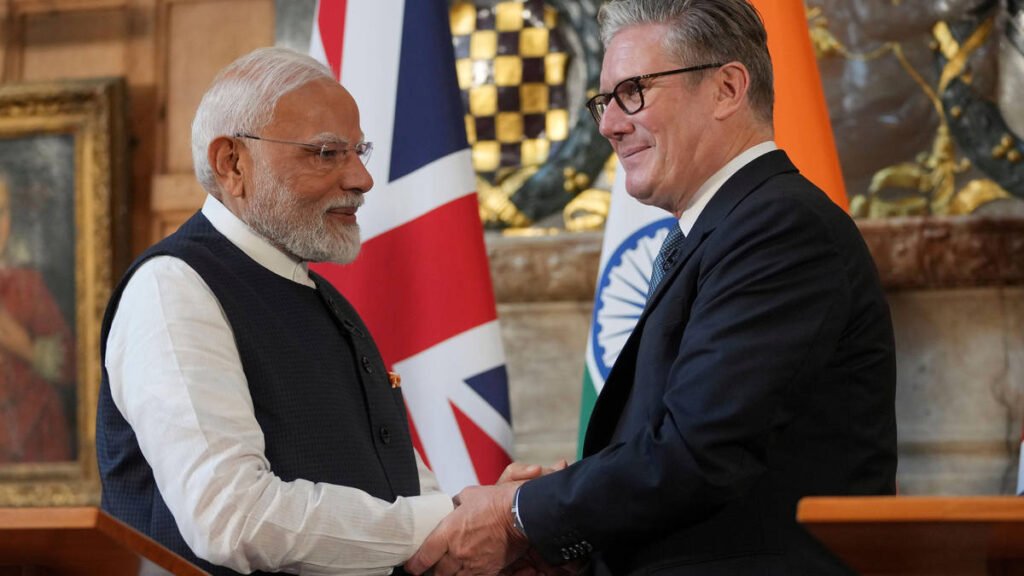24 July 2025, 11:27 | Updated: 24 July 2025, 11:53

Picture:
Alamy
Sir Keir Starmer and India’s Prime Minister Narendra Modi have written ‘a new chapter’ in the UK and India’s shared history after the signing of a ‘historic’ trade deal by the two leaders.
Meeting at the Prime Minister’s country residence, Chequers, Starmer and Modi branded it a “historic day” for trade between the countries.
Speaking following the signing, Mr Modi said the two nations were “writing a new chapter” in the UK and India’s shared history.
The deal is set to be worth £6 billion in investment for the British economy and the two leaders have also agreed to increase efforts to tackle illegal migration and organised crime.
Sir Keir said: “I’m really pleased and privileged to welcome you here today on what I consider to be a historic day for both of our countries, and the delivery of the commitment that we made to each other.”
Mr Modi, speaking via a translator, described the UK and India as “natural partners.”
It comes as Starmer told LBC that the move is a “big win for British business” that will boost the UK economy by around £4.8 billion every year.
Business Secretary Jonathan Reynolds and his Indian counterpart Piyush Goyal then formally signed the trade agreement in the great hall of Chequers.
Read more: Whisky tariffs to be halved by ‘fantastic’ India trade deal

Picture:
Kin Cheung/PA Wire
The UK-India trade deal is understood to be the largest of its kind for its economic impact on Britain.
It will see tariffs on an array of British goods reduced from an average of 15 per cent to 3 per cent, with the aim of boosting the £11 billion of imports into the south Asian nation.
Whisky tariffs will be slashed in half and will fall further over successive years, while other industries including soft drinks, cars and cosmetics are also expected to see cheaper duties.
The trade deal is not the “extent or the limit” of Britain’s co-operation with India, Starmer said.
The Prime Minister said: “This is not the extent or the limit of our collaboration with India.
“We have unique bonds of history, of family and of culture, and we want to strengthen our relationship further, so that it is even more ambitious, modern and focused on the long term.”
He said the so-called India-UK Vision 2035 strategy, launched alongside the deal, sets out how the countries will work more closely on areas such as defence, migration, climate and health.
Read more: Trump says he will meet Starmer in ‘oil capital’ Aberdeen in surprise visit to ‘refine’ trade deal
Read more: UK exports to US returned to growth in May as trade deal cut some key tariffs

Picture:
Kin Cheung/PA Wire
The deal is expected to result in 2,200 jobs across the country and £6 billion investment by British and Indian businesses.
The UK and India are also bolstering co-operation on tackling corruption, fraud, organised crime and illegal migration, by sharing criminal records and other intelligence.
But the deal has not given the UK as much access as it would have liked to India’s financial and legal services industries.
The agreement promises some benefits for the UK’s financial services, with Chancellor Rachel Reeves understood to have pushed on behalf of the sector in discussions with her Indian counterpart.

Picture:
Kin Cheung/PA Wire
But more wide-ranging access was not agreed, and talks continue on a bilateral investment treaty aimed at protecting British investments in India and vice versa.
The two nations also continue to discuss UK plans for a tax on high-carbon industries, which India believes could hit its imports unfairly.
Negotiations on the deal began when Boris Johnson was prime minister in 2022, and were concluded in May this year.
Shadow business secretary Andrew Griffith said it had only been made possible “because of Brexit delivered by the Conservatives.”

Picture:
LBC
The Confederation of British Industry (CBI) has said that the signing “sends a powerful signal that the UK is open for business and remains resolute in its commitment to free and fair trade.”
Chief executive Rain Newton-Smith added: “A trade agreement with India – one of the world’s fastest-growing economies – is a springboard for long-term partnership and prosperity. UK firms can take advantage of this new platform to scale, diversify and compete on the global stage.”

